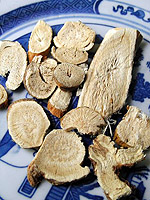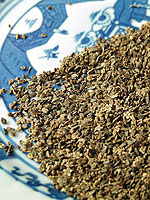There are surgical procedures and drug remedies for external usage.
Traditionally, TCM surgical procedures are relatively simple and minor. They include making incisions for pus drainage; cauterization to stop bleeding, to remove polyps and abnormal protruding tissues; and pricking to let out blood or fluid for relieving swellings or joint effusions, as well as special ligation techniques to cut off nevus, piles or anal infections.
For external applications of herbs, different preparations are used to ensure that their full therapeutic effects are felt. |
 |
| Stretching board |
|
1. Steaming and washing
Herbs are decocted with water, wine and vinegar, with the liquid being used for washing and steaming. This method can dissolve swelling or masses, activate the blood, relieve pain, clean and irrigate the wound, and promote healing. They are also used in skin allergies, acne and rosacea. For example:
|
A decoction made with honeysuckle flower, forsythia capsule, dandelion and Tokyo violet herb can be used for acute early-stage infections over the body surface. |
|
A vinegar solution in which alum, light yellow Sophora root (ku shen) and common Cnidium fruit (she chuang zi) have been soaked is used for hands and feet in cases of fungal infection. |
|
An alcohol solution in which safflower, Sichuan lovage, Suberect Spatholobus stem (ji xue teng), Caulis Piperis Kadsurae (hai feng tang) has been soaked, is used for painful conditions due to blood stasis. |
|
 |
| Flavescent sophora root |
|
2. Topical Applications of herbs
Herbs are prepared in pastes, soft extracts, lozenges or powders and applied locally. This is the most popular remedy in external medicine, and is applied for a wide range of conditions. Sample herbs are:
|
Herbal ingredients like dandelion, tokyo violet herbs, purslane herbs, cotton rose leaves, wild chrysanthemum leaves, paris polyphylla smith and sponge cucumber leaves, which help to clearing heat and relieve swelling. Each herb can be freshly ground and then applied on the newly formed infection site twice a day. |
|
Couch grass tassels, eclipta and sponge cucumber leaves help to arrest bleeding. They can be ground and used for arresting local bleedings. |
|
Paniculated swallow-wort root (xu chang qing), common cnidium fruit (she chuang zi), belvedere fruit, sun ruphorbia herb (ze qi) and curled dock can arresting itching, and are usually used in various skin remedies. |
|
 |
| Belvedere fruit |
|
Some commonly used external preparations include:
|
Adhesive plasters for different kinds of infection, which are applied by direct pasted on the affected area, e.g., Tai Yi Gao ( 太乙膏 ) can ease swelling, detoxify and promote regeneration of wounds. |
|
Oily ointments for skin ulcers with little effusion and hemorrhoids. They are applied by smearing evenly on the cleaned wound, e.g., Sheng Ji Bai Yu Gao ( 生肌白玉膏 ). This ointment promotes lubrication and tissue growth, making it suitable for wounds that have difficulty closing, anal fissure and nipple splitting. |
|
Powders, which are applied by scattering directly onto the lesion, a sticky plaster, or inserting into the deep lesion with a thread. These are used to stop bleeding, reduce pain and swelling, astringency, so promoting tissue generation. For example, Regeneration Powder ( 生肌散 ) is for wound closure; Peach Blossom Powder ( 桃花散 ) is for arresting bleeding; Natural Indigo Powder ( 青黛散 ) is for astringency, relieving swelling and arresting itchiness. |
|
Alcohol extractions, which are made by soaking the ingredients in alcohol to extract the active ingredients and then concentrated. They are suitable for frostbite, gangrene of the fingers and toes, fungus infections and facial eczema. |
3. Some important auxiliary modalities in external medicine
|
Medicinal Cupping: Bamboo cups are boiled or steamed in a concentrated decoction for five minutes. The treated cups are then placed immediately on the selected area. This is mainly used to drain running sores or absorb toxins out of body. |
|
Acupuncture and moxibustion: Acupuncture is usually used for relieving pain and promoting urination after surgery. Moxibustion is applied when the wounds do not easily heal due to low immune functioning. |
|
Herbal Compress: The compress contains a combination of herbs that are specially stir-fried by sprinkling with wine or vinegar. The heated bundle is then applied directly over the diseased area for a massage session. This is effective for sprains, strains of the muscles and tendons, stiffness in the joints, inflammation and is also used to stimulate the circulation of the blood. The selected herbs are usually fragrant and pungent in flavor, which enable their medicinal properties to be absorbed through the skin. |
|
Thermal Therapy: This is suitable for certain skin conditions such as fungus infections, eczema, and psoriasis which is applied by smearing drugs over the lesions and then warming by fire or light. |
|